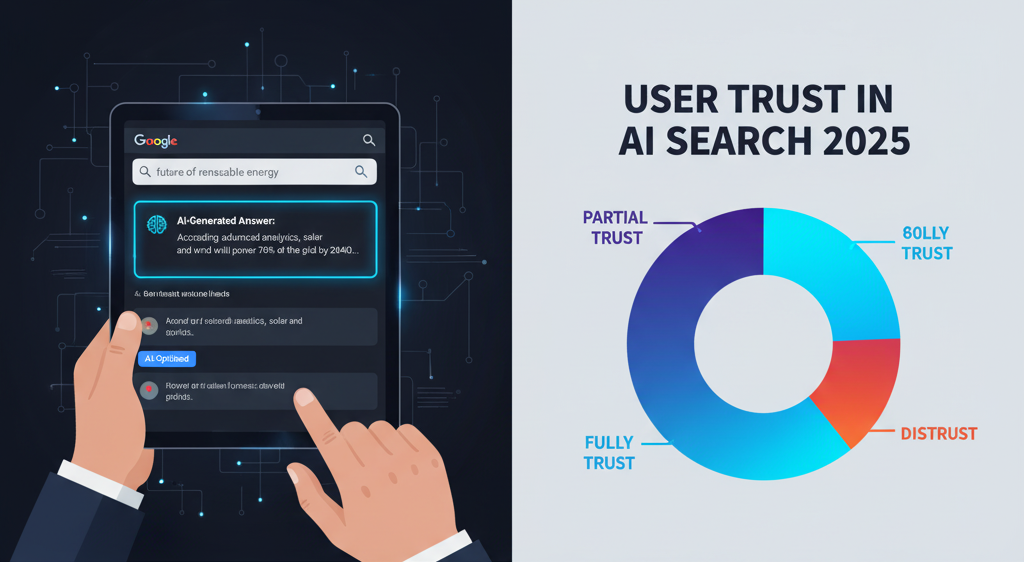Cold Truth: AI Search Is Everywhere
Search is changing fast in 2025. Old SEO tricks like keywords and backlinks alone are not enough. AI tools, social platforms, and user-generated content (UGC) are changing how people find and trust information.
But here’s the question: do people really trust AI search results? The answer is mixed. People like AI because it’s fast, but they are careful about believing it.
For example, ChatGPT has over 400 million weekly users and is expected to reach 1 billion by the end of 2025. It’s popular with younger audiences. But even with this growth, trust is not automatic.

The Stats That Show the Truth
- 58% of adults have seen AI summaries in search results, but only 20% fully trust them.
- 70% somewhat trust AI results, but 75% worry about mistakes.
- Younger users (18–30) are more likely to trust AI, with 44% preferring AI answers over traditional search.
Graph Idea: Pie chart titled “User Trust in AI-Generated Search Results (2025)”:
- Fully Trust → 20%
- Somewhat Trust → 70%
- Don’t Trust → 10%

These numbers show that people are using AI, but trust is still a big question.

Why People Don’t Trust AI
- Wrong Answers: AI sometimes gives answers that sound confident but are wrong.
- No Responsibility: If AI is wrong, nobody takes the blame.
- Bias: AI can be unfair or show only certain viewpoints.
- No Sources: People like to check where info comes from. AI often doesn’t show this.
Example: A small store, “EcoHome Gadgets,” noticed AI search suggested competitor products even though they had better reviews. Users clicked competitors instead—trust mattered more than speed.

Why Some People Do Trust AI
- Fast Answers: AI gives quick responses, saving time.
- Younger Users: Gen Z and millennials are comfortable trusting AI.
- Feels Unbiased: People assume machines don’t lie.
- AI Everywhere: ChatGPT, Bing, Slack, and Google Docs make AI easy to use daily.
Example: Shopify store owners use AI to draft product descriptions, then check for accuracy. Users trust the speed, but humans still verify.

What This Means for SEO Pros
- If people don’t trust AI, your high-quality, reliable content can get more attention.
- If people do trust AI, your content must work well for AI to show it in search results.
AI is becoming a gatekeeper. Websites that don’t optimize for it might lose traffic. Brands that use authority, facts, and clear info will stay visible.
Example: Websites like Moz and HubSpot often appear in AI summaries. Even if users don’t click the link, these brands get recognition and trust.

Practical Tips to Stay Ahead
- Cite Sources: Use trusted studies and links so AI and users know your content is reliable.
- Keep Content Simple and Useful: One clear idea per paragraph. Avoid fluff.
- Show Expertise: Add author names, credentials, and E-E-A-T signals.
- Go Deep Where AI Fails: Give more detailed advice than AI can provide.
- Use Videos and Images: Help people and AI understand your content.
- Use Social Proof: Reviews, Reddit, and Quora answers increase trust.
- Check AI Mentions: Use tools like Peec AI or Scrunch to see if AI cites your content.
- Optimize Video Content: YouTube and TikTok videos boost engagement and search visibility.

Brutal Closing
AI may fool Google, but don’t let it fool your readers.
Trust is earned, not automatic. People still decide what to click, read, and share. Brands that focus on clarity, facts, and trust win.
Search in 2025 is fast, AI-driven, and peer-focused. Adapt, and AI will help your content. Ignore, and you will fade. Always write for humans first—AI will follow.

